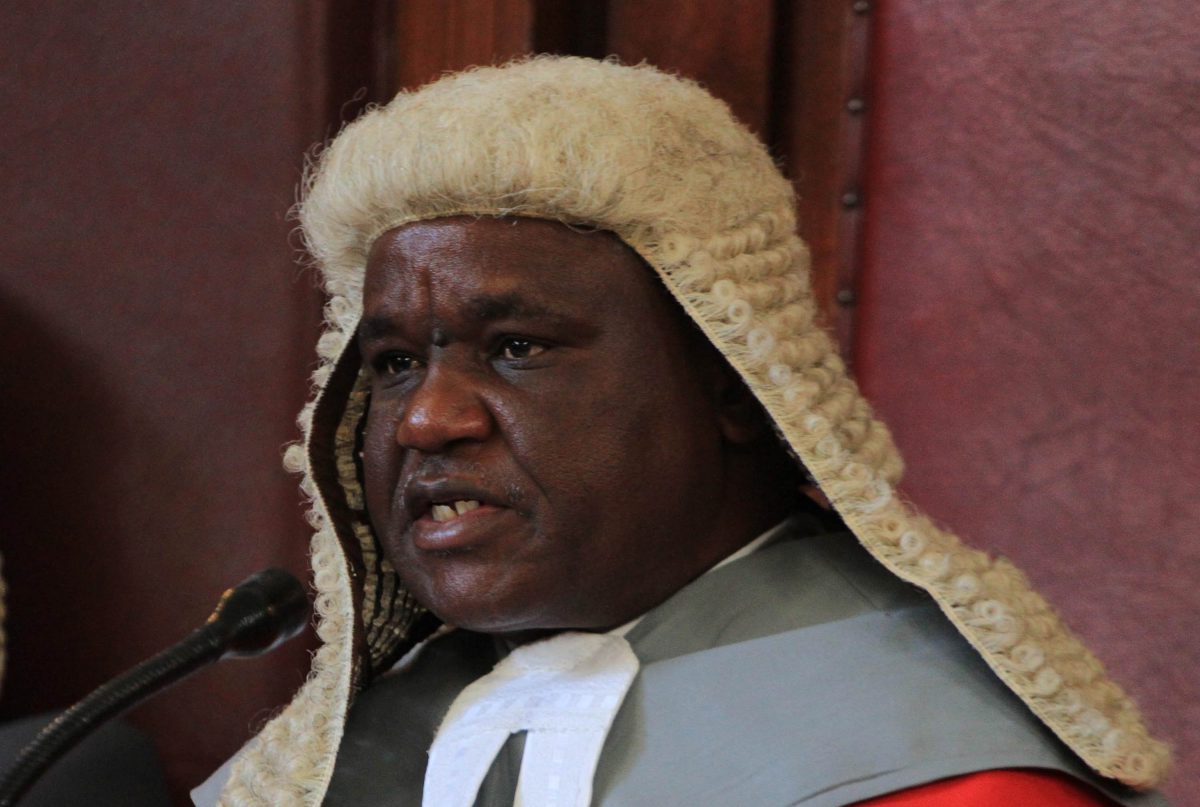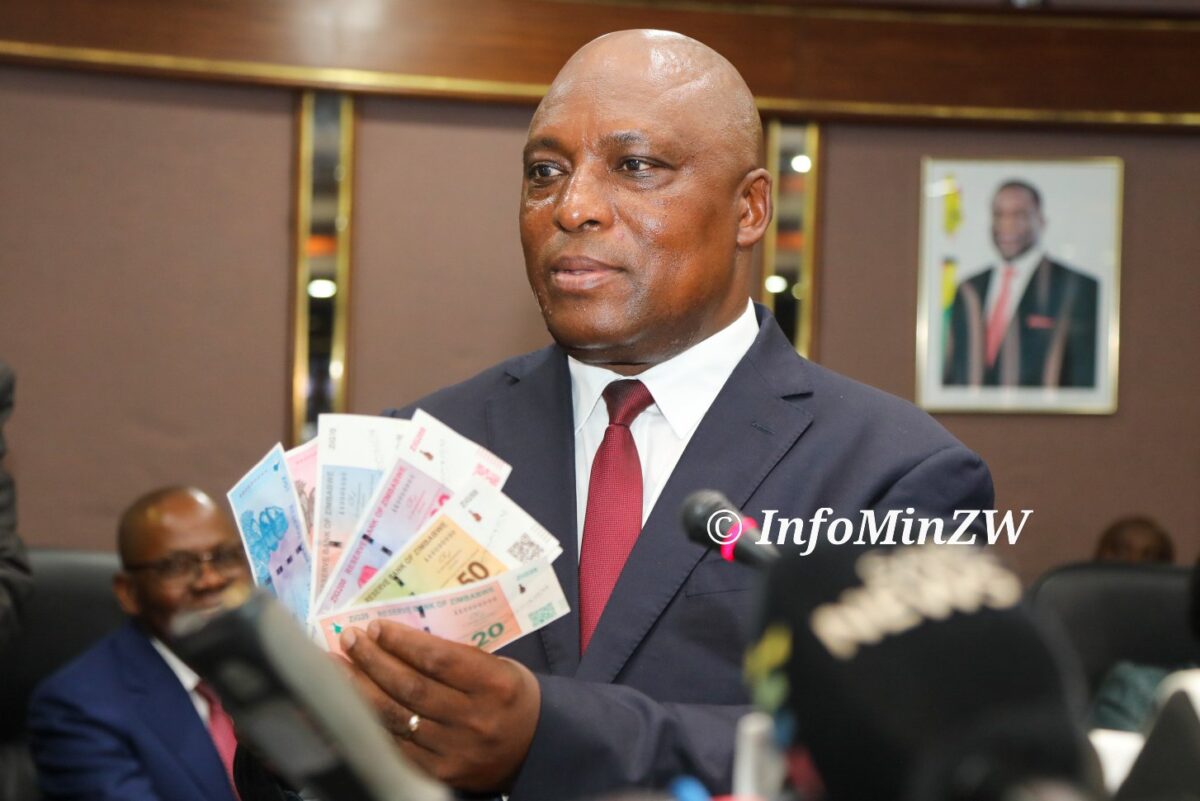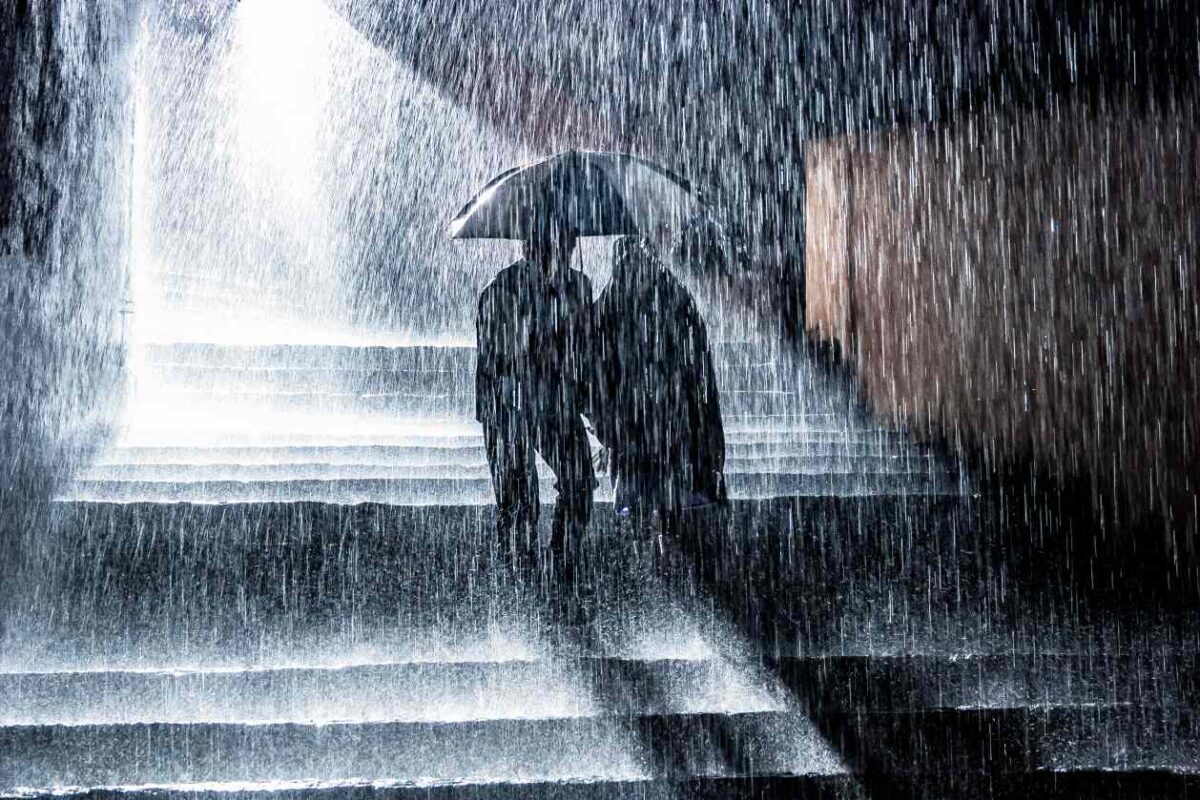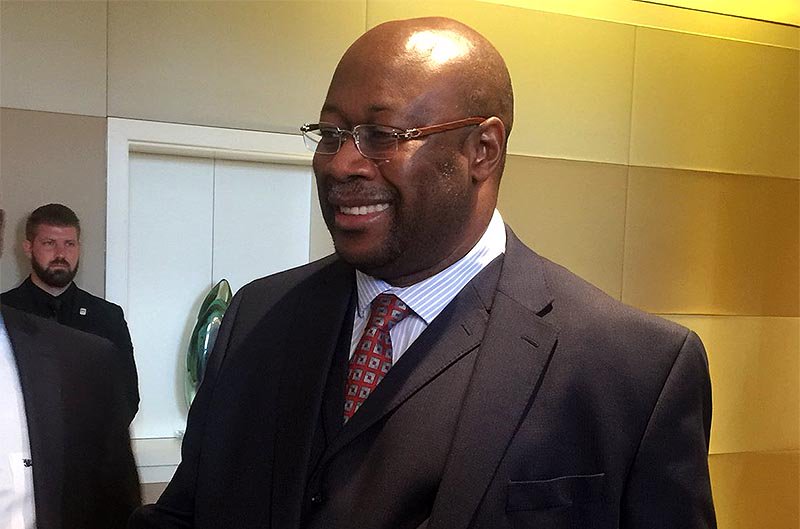THE historic application against the brazen theft of the people’s vote by the Zimbabwe Electoral Commission to benefit Emmerson Mnangagwa and Zanu PF has been heard by the Constitutional Court.
While there’s has been a lot of hyperbolic nonsense about Advocate Tawanda Kanengoni, a closer examination of his submissions shows beyond any doubt that he is a liar of a lawyer. He did not tell a single truth. A particularly insidious lie was his claim that a V11 is connected to vouchers or batches of ballot papers; and that each V11 relates to 1 to 12 such batches or vouchers. He even said something to the effect that a V11 has three pages and that you must look at all the pages to understand its contents. He said all this rubbish in response to Advocate Thabani Mpofu’s revealing submissions of V11s that were signed but blank.
V11 forms are one-page declaration of results at a polling station that are signed by polling agents and the presiding officer. When V11 forms are taken to a collation or Ward centre, the results from the polling stations in the Ward are added and recorded in V23 forms, which enable the winning Ward councillor to be declared. The V23 forms are then taken to the Constituency Centre.
Talking about Advocate Mpofu, he and his legal team were superb and amazing. Mpofu’s performance in court was a matter of pride. He was professional, fearless and heroic. It is regrettable and shameful that, as Emmerson Mnangagwa’s election agent, Ziyambi Ziyambi abused his position as Minister of Justice, Legal and Parliamentary Affairs to deny the required certificates to several senior advocates from the Republic of South Africa, including Dali Mpofu, who ended up unable to work with Adv Mpofu in court. This xenophobia has exposed Zanu PF’s phoney claims to pan Africanism and SADC solidarity.
The constitutional challenge to the ZEC charade is now in the hands the of the honourable justices of our Constitutional Court. Zimbabweans, as well the international community, now eagerly await the outcome; and they expect that it will reflect the will of the people of Zimbabwe that was expressed on 30 July when millions voted for Advocate Nelson Chamisa as their President to lead them in a truly new Zimbabwe based on the rule of law and not on the rule of big men, like Mnangagwa and Constantino Chiwenga, who consider themselves to be Zimbabwe’s exclusive stockholders and who want to drag the country with them to their graves.
Meanwhile, well-meaning and thinking Zimbabweans are dismayed by attempts by the people’s usual detractors, the junta and its media mouthpieces like the Herald and the Chronicle, to mislead the nation and even the world that somehow Nelson Chamisa’s formidable application should have relied on the election residue that is in the custody of ZEC. Yes, in the custody of the very same ZEC that has shown itself to be opaque and against every tenet of good and transparent governance as enshrined in the Constitution to guide Chapter 12 institutions such as ZEC.
The preposterous presumption that the MDC-Alliance should have relied on election residue in ZEC’s custody to make its case should be rejected with the contempt it deserves. Its utter nonsense. Kids call it bullshit. Fortunately, the honourable justices of our esteemed Constitutional Court know better. They cannot be swayed by bullshit, at least they must not be swayed by it.
The people’s detractors cannot be the ones to dictate to us what the basis of Chamisa’s application should have been. Their diabolic plot to pre-set the application was apparent right from the beginning. It was an act foresight and wisdom for Chamisa to refuse to fall for it. It is common cause that the regime’s rogue elements, especially among the ranks of the Military Intelligence Department (MID), have been having a field day manipulating the election residue in the ballot boxes and even printing through Fidelity Printers new copies of the voters roll to cover up their theft of the people’s vote.
There’s no Zimbabwean with access to the social media who has not seen shocking video clips of unsealed ballot boxes with unsealed envelopes containing V11 Forms and other election material (residues) being transported on election night (July 30) and the wee hours of July 31 without being escorted by Police and without polling agents. Embarrassing and shocking stories, primary evidence, about these incidents are coming as sure as the fact that tomorrow is coming. It’s a matter of time before all hell breaks loose, and this time it’s not going to be pretty.
And we now hear all this noise that Chamisa must have used primary data. This is coming from people who would not recognise primary data if it smacked them on their faces. What does primary data mean? Is there only one form of primary data? Here are two prosaic definitions:
- A primary source provides direct or first-hand evidence about an event, object, person or work of art. Primary sources include historical and legal documents, eyewitness accounts, results of experiments, STATSTICAL DATA, pieces of creative writing, audio and video recordings, speeches, and art objects.
- Primary evidence is that evidence which suffices for the proof of a particular fact until contradicted or overcome by other evidence. Primary evidence refers to an authentic document or item that is offered as proof in a law suit or court case, as contrasted with a copy of, or substitute for, the original.
For the avoidance of doubt, and when it comes to election challenges, there are at least three internationally tried and tested sources of primary evidence, namely:
- The election residue in the ballot boxes;
- The server of the election body (ZEC) storing the original results and;
- The data made public by the election body (ZEC).
Considering the rampant manipulation of ballot boxes by the regime’s rogue elements, it is understandable why the MDC Alliance deliberately chose to rely on the ZEC server; as well as on the data published by ZEC itself as its preferred primary evidence. This is because the election residue in the ballot boxes was compromised. Relying on it would have been no better than drinking from a well that is known to have been poisoned.
To insist that the MDC-Alliance should have proved its case by relying on election residue in ballot boxes that are known to have been tampered with is no different from asking one to prove that diesel does not flow from Chinhoyi rocks. It’s crazy.
Despite diligent and documented efforts by the MDC-Alliance’s lawyers to use a subpoena to access the ZEC server within a limited court process, that subpoena that they sought, as primary evidence, to expose the ZEC server was inexplicably denied by Chief Justice Malaba through the Constitutional Court’s Registrar on 20 August 2018, ahead of the 22 August hearing. The case management meeting held on 16 August 2018 became a pre-trial conference, after the fact. While nothing would be gained by speculating as to the reasons for this denial, it was a disappointing development.
As already pointed out, there are three tried and tested primary sources of election material that are used to found or base a case alleging impropriety by an election body such as ZEC: one is election residue in ballot boxes, the other is data on the server with the results entered in real time and the other is data published by the election body.
Election residue is accessed through an application for a recount within 48 hours in terms of the Electoral Act. The MDC-Alliance rightly ignored this option for the reasons already mentioned. Access to the server is accessed through a subpoena to ZEC sanctioned by the court. This is the route that Chamisa’s lawyers took, only to be inexplicably, and unlawfully, blocked by the same Court that attempted to take Chamisa to task for ostensibly not having sought primary evidence in the custody of ZEC. Having rightly declined to seek election residue in the ballot boxes that have been tampered with and having been inexplicably blocked by the Constitutional Court from legally accessing primary data on the ZEC server, Chamisa’s lawyers were left with only the option of relying on the data published by ZEC. This data published by ZEC is not secondary data, but primary evidence generated and owned by ZEC and it proves beyond reasonable doubt that ZEC manipulated and compromised the presidential election result.
Significantly, the data on that ZEC server shows that Advocate Chamisa won the presidential election with more than 57 per cent of the vote. This is the basis upon which the relief sought by Chamisa’s lawyers was to have the Constitutional Court to declare him the winner. It is also in this connection that at one of his press briefings on the case after ZEC had declared the disputed presidential election result, Advocate Mpofu indicated that he had a secret weapon. That weapon was the subpoena to access the ZEC server.
ZEC first announced a result on television based not on the Server but on an Excel Spreadsheet. It also issued a CD to stakeholders; that CD had different results from those ZEC had announced on television. When Chamisa brought ZEC before the court it brought a different result from that which it had announced on television as well as that which was on the CD it had distributed.
The import of this is that ZEC has given three different results and has made no effort to explain the change in data from what was announced on television to what was then given to stakeholders on CD and to what it presented in court in response to our application. In this regard, Advocate Thabani Mpofu asked in court yesterday, “if Mnangagwa won this election, how many votes did he get?” The nation is unable to answer this simple question.
It is impossible to imagine a scenario under which any reasonable court in constitutional democracy, would ignore the fact that the ZEC has abandoned the presidential result it announced on 3 August 2018, giving Mnangagwa 50.08% of the vote, and subsequently announced new and different and unverified results on two separate occasions without any legal basis whatsoever. This scandalous situation was not impeached in court. Again, we cannot see how any reasonable court can let this stand without inflaming our republic.
Therefore, even without access to the ZEC server, which was denied without good cause, the MDC-Alliance was able to rely on the primary evidence based on the data published by ZEC itself. Those who have called this data not primary or not evidence, are frankly mad. Otherwise everyone now knows that, based on the contradiction of its own numbers, the three different results officially announced by ZEC, two of them illegally announced outside the due process of the law after 3 August 2018, cannot be relied upon and must be set aside by the Constitutional Court. If the Constitutional Court condones ZEC’s gross misconduct, there will be a monumental crisis in the country. No doubt about that.
There are other serious irregularities committed by ZEC with no explanation or justification in its court papers or oral submissions. These include but are not limited to ZEC’s failure to explain the 40,000-vote difference between the presidential and parliamentary totals. While ZEC sought to hide behind a false claim that some constituencies were uncontested, or that some voters chose to cast only the presidential ballot, and could thus cause a disparity, this quickly unravelled after ZEC conceded that all parliamentary seats were contested and as such the uncontested seats argument could not explain the disparity.
Regarding the claim that some voters chose to ask only for the presidential ballot paper, ZEC did not explain why it flouted Section 56(3)(a) of the Electoral Act which requires it to keep a record of every voter who elects not to accept a ballot paper. Furthermore, ZEC’s own handbook requires Form PE2005/AA returns, that would explain this disparity. Not a single Form PE2005/AA was presented to the court. Not even one. So why should ZEC, which has distinguished itself by being terribly opaque before and throughout the election period, be trusted without providing evidence?
It is helpful that the people of Zimbabwe had an opportunity to observe the hearing on 22 August. It was important for the entire nation and the world to hear the compelling reasons why the MDC Alliance is contesting the presidential result of the election and the unimpeachable evidence it has relied on based on ZEC’s own unsustainable data. The reasons are fundamental, and they relate to the core of the survival of Zimbabwe’s constitutional democracy which is based on the sanctity of the cardinal principle of one person one vote; as an overarching gain of country’s hard-won national Independence after a protracted liberation struggle. In terms of the Constitution of Zimbabwe, executive, legislative and judiciary power is derived from the people in free, fair and credible elections based on one person, one vote. The survival of this principle is now in the hands of the Constitutional Court.
Professor Jonathan Moyo is a former government minister in Zimbabwe now living in exile















